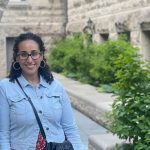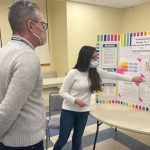Three New Haven teachers were chosen for the Noyce Math Teacher Leader Program, a five-year professional learning and service program intended to expand Connecticut’s capacity to advance more equitable mathematics education, according to the school district. Program partners include the University of Connecticut’s Neag School of Education and its College of Liberal Arts and Sciences Department of Mathematics, as well as the Connecticut State Department of Education.
Connecticut Education Association President Kate Dias ’97 MS, 6th Year is focusing her attention on the educational workforce, and hopes the session will yield approvals of public acts addressing educators, namely better working conditions and recruitment and retention of teachers.
The group started reaching out to legislators weeks before the session, Dias says, offering itself as a resource for questions or topic temperature checks in advance of any bill packages that may come out over the next few weeks.
This week, we welcome Fany Hannon, Neag School alumna a director of the Puerto Rican/Latin American Cultural Center, which is celebrating its golden anniversary this year. Fany talks about how the Center emerged from the civil rights movement of the 1960s and 1970s, what it’s been like trying to keep a student-oriented organization running during a global pandemic, and why so many generations of Latinx Huskies consider PRLACC a home away from home.
“When someone feels like their rights are being violated or the government is overstepping their bounds, they’ll cite the Holocaust, which is very dangerous,” says Alan Marcus, a professor in UConn’s Neag School of Education.
Marcus recently was part of a team that produced a research study that was published in “Holocaust Studies” that examined the transition of Holocaust education from live to virtual survivor testimony. Marcus also wrote a column for The Conversation on the issue.
Congratulations to the recipients of the Neag School of Education Alumni Board Scholarship for 2022: Sandeep Dutta, a doctoral student in learning, leadership, and education policy (LLEP) with a concentration in sports management; Yasmin Elgoharry, a doctoral student in LLEP with a concentration in higher education racial justice and decolonization; and Joselyn Perez, a doctoral student studying research methods, measurement, and evaluation. The Alumni Board Scholarship provides a $1,000 award annually to students enrolled in a Neag School master’s, doctorate, or sixth-year program who have proven academic excellence or demonstrated financial need.
The Neag School of Education at The University of Connecticut is hosting an accreditation visit by the Council for the Accreditation of Educator Preparation (CAEP) on May 1, 2022. Interested parties are invited to submit third-party comments to the evaluation team. Comments must be received no later than 6 weeks prior (March 20, 2022) to the CAEP site visit date.
Congratulations to our Neag School alumni, faculty, staff, and students on their continued accomplishments inside and outside the classroom. If you have an accolade to share, we want to hear from you! Please send any news items and story ideas to neag-communications@uconn.edu. In addition to the Dean’s Office and Department achievements, explore this edition’s Accolades from the following: Faculty/Staff; Alumni; Students; as well as In Memoriam.
Students who are both academically talented and also on the autism spectrum can enjoy greater success in college based on the correct high school experience. That’s the finding of research performed by a UConn team in the Neag School of Education and published in a recent issue of the Journal of Autism and Developmental Disorders. The study used the largest sample of academically advanced students, who also have autism, in any research study ever conducted. The authors were interested in researching a group where the focus is typically on disabilities, not talent and abilities.
“School assignments that a student is expected to do outside of the regular school day—that’s homework,” says Sandra Chafouleas, a UConn Board of Trustees Distinguished Professor at the Neag School of Education. “The general guideline is 10 minutes of nightly homework per grade level beginning after kindergarten. This amounts to just a few minutes for younger elementary students to up to 2 hours for high school students.”
Students who are both academically talented and also on the autism spectrum can enjoy greater success in college based on the correct high school experience. That’s the finding of research performed by a UConn team in the Neag School of Education and published in a recent issue of the Journal of Autism and Developmental Disorders.





